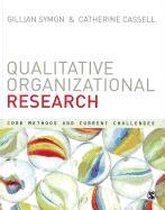QUALITATIVE ORGANIZATIONAL RESEARCH – SYMON &
CASSEL
2017-2018 | BLOK 1
,Inhoud
Chapter 2 – Philosophies underpinning qualitative research .................................................................. 2
Chapter 5 – Reflexivity in qualitative research......................................................................................... 4
Chapter 6 – Ethical research practice ...................................................................................................... 7
Chapter 12 – Assessing qualitative research............................................................................................ 9
Chapter 14 – Interviews ......................................................................................................................... 11
Chapter 15 – Focus groups .................................................................................................................... 13
Chapter 17 – Participant observation .................................................................................................... 13
Chapter 19 – Practising organizational ethnography ............................................................................. 15
Chapter 20 – Case studies in organizational research ........................................................................... 17
Chapter 22 – Using documents in organizational research ................................................................... 19
Chapter 24 – Doing template analysis ................................................................................................... 21
Chapter 26 – Discourse analysis and discursive research ...................................................................... 24
Langley & Abdallah – templates and turns in qualitative studies of strategy and management ....... 26
Essers – Reflections on the narrative approach: dilemmas of power, emotions and social location
while constructing life-stories ............................................................................................................ 30
1
,Chapter 2 – Philosophies underpinning qualitative research
Introduction
The primary aim of this chapter is to explore how qualitative research methods may be developed
differently given the various modes of philosophical engagement.
Epistemology
Epistemology is usually understood as being concerned with knowledge about knowledge. In other
words, epistemology is the study of the criteria by which we can know what does and does not
constitute warranted, or scientific, knowledge. That is, what do we mean by the concept ‘truth’ and
how do ew know whether or not some claim, including our own, is true or false.
Ontology
Ontology is a branch of philosophy dealing with the essence of phenomena and the nature of their
existence. Hence to ask about the ontological existence of something is often to ask whether or not it
is real or illusory. Ontological questions concern whether or not the phenomenon that we are
interested in actually exists independent of our knowing and perceiving it – or is what we see and
usually take tob e real, instead, an outcome of these acts of knowing and perceiving?
• Realist assumptions entail the view that it exists ‘out there’, independent of our perceptual
or cognitive structures.
• Subjectivist assumptions about the ontological status of the social phenomena we deal with
– such as stress – entail the view that what we take tob e social reality is a creation, or
projection, of our consciousness and cognition.
What we usually assume to be ‘out there’ has no real,independent, status separate from the act of
knowing. In perceiving or knowing the social world we creat it – we are just not usually aware of our
role in these creative processes.
Positivism
Two of the most significant characteristics of positivist epistemology concern:
1. The claim that science should focus on only direct observable phenomena with any reference
tot he intangible or subjective being excluded as being meaningless;
2. Theories should be tested, in a hypothetic-deductive fashion, by their confrontation with the
facts neutrally gathered from a readily observable external world.
A key aspect of positivism is the tendency to reduce human behaviour to the status of automatic
responses excited by external stimuli wherein the subjective dimension to that behaviour is lost,
intentionally or otherwise. This reduction is achieved by positivists attempting to follow what is
presumed to be the methodological approach taken in the natural sciences. This entails ingnoring the
subjective dimension of human action.
Qualitative neo-positivism
Qualitative neo-positivism, although different from mainstream positivism, shares its commitment to
a theory-neutral observational language: that it is possible to neutrally apprehend the facts ‘out
there’. Although qualitative researchers may seek to distance thenselves from positivism – the
reliance on tools and techniques – the assumption that bias can be removed, and that with the right
tools and techniques peoples’ subjective realities can be accessed, shows some continuity with the
past.
Interpretivism
All interpretive traditions emerge from a scholarly position that takes human interpretation as the
starting point for developing knowledge about the social world. Interpretivists are less likely to be
concerned with mirroring the tenets of positivism, in that their search for the understanding of
2
, interpretation offers different approaches to how emperical work is conducted and the role of the
researcher within it.
Hermeneutics is one of the underlying principles. Hermeneutics means that the meaning of a part
can only be understood if it is related to the whole. The key heuristic device for understanding and
interpretation is the hermeneutic circle. Within the hermeneutic circle the link between pre-
understanding and understanding is made. No one comes to interpretation with an open mind,
rather ther is the pre-understanding of the phenomenon that we already have. Hence the
hermeneutic circle focuses upon the iteration of interpretation where preunderstanding informs
understanding and so on, leading to a greater understanding of both. Ethnomethodology is another
key principle in interpretivism. Ethnomethodology builds on the philosophy of phenomenology to
seek to understand and interpret how individuals make sense of their life worlds. It is more
interested in the ways in which interpretive schemas are put into practice and accepted, altered or
rejected. Another key issue is the concept of sense making; how individuals or groups retrospectively
make sense of events such as disasters or crises.
Critical theory
Critical theory focuses on the inherent connection between politics, values and knowledge and
thereby provokes a deeper consideration of the politics and values that underpinand legitimize the
authority of scientific knowledge. The aim of critical theory-based approaches towards organizational
research is to understand how the practices and institutions of management are developed and
legitimized within relations of power and domination such as capitalism. Yet critical theory also
asserts that systems can and should be changed, thus qualitative research from this perspective
tends to have an orientation towards investigating issues such as exploitation, asymmetrical power
relations, distorted communication and face consciousness.
Postmodernism and post structuralism
Qualitative researchers from these traditions favour a position where subjectivist ontology is
combined with a subjectivist epistemology. This involves abandoning ‘the rational and unified subject
in favour of a socially and linguistically decentred and fragmented subject’. Postmodernist
epistemology dismisses the positive rational certrainty in the attainability of epistemic privilege and
replaces it with a relativist view of science and knowledge. From a postmodern perspective any
attempt to develop a rational and generalizable basis to scientific enquiry that explains the world
from an objective standpoint is flawed.
Instead, postmodernists put forward a perspective where all knowledge is intedeterminate: what we
take to be reality is itself created and determined by those acts of cognition. A key element of
postmodern research has been a renewed focus on language. The ‘linguistic turn’ suggests that
language is never innocent; that no meaning exists beyond language; that knowledge and truth are
linguistic entitites and constantly open to revision. Therefore, discourses play an important role.
What we take tob e knowledge is constructed in and through language.
Post colonialism and indigenous epistemologies
Post colonialism is extraordinarily relevant for management and organization studies because it
offers an alternative historical explanation for many commonplace business pratices that have their
origins in kolonial structures. For qualitative management and organizational researchers, such
epistemological approaches offer new ways of critiquing management processes and practices and
the possibility of framing research questions in innovative ways.
3





